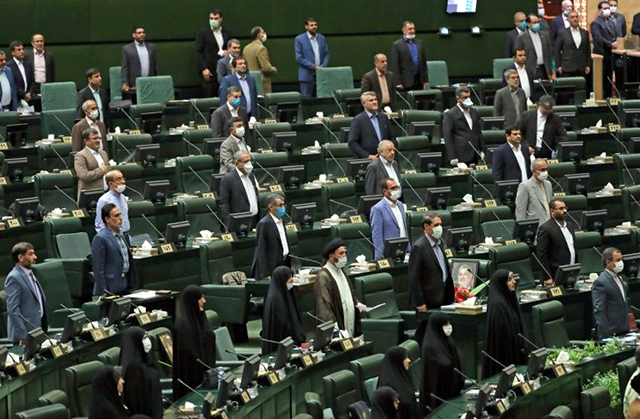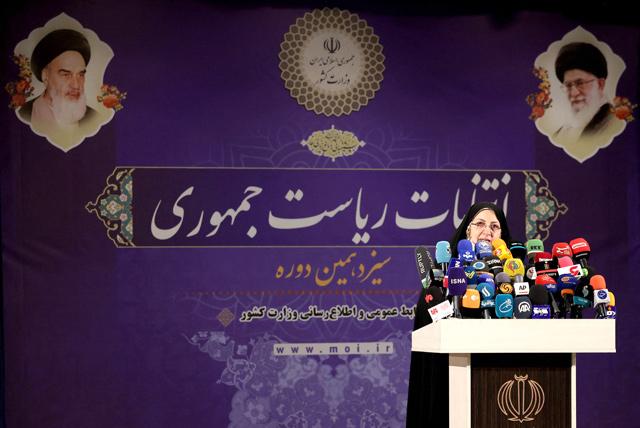You are here
Rouhani urges Iran MPs to 'cooperate' as parliament opens
By AFP - May 27,2020 - Last updated at May 27,2020

For the opening session of Iran's new parliament, a seat was left vacant between each lawmaker in accordance with social distancing guidelines (AFP photo)
TEHRAN — Iranian President Hassan Rouhani urged lawmakers to "cooperate" with his government in a speech on Wednesday during the inaugural session of the new parliament following a February election swept by conservatives.
Many MPs are ultra-conservatives who oppose Rouhani on almost all issues, from running the sanctions-hit economy and combating the coronavirus outbreak to managing relations with arch foe the United States.
The parliament, which shapes debate in Iran, had been closed for six weeks until April 7 as part of measures aiming to curb the spread of COVID-19.
Iran has been hit by the Middle East's deadliest outbreak. The health ministry said the virus had claimed another 56 lives in the past 24 hours, taking the overall toll to 7,564 dead out of 141,591 cases.
"I hope that in the year that remains for this government, we will be able to cooperate and work together," Rouhani said in the address before the parliament, or Majles.
Iran held a legislative election on February 21 and is scheduled to hold a presidential poll in around 12 months.
The 11th parliament since the 1979 Islamic Revolution opened as the country's economy gradually returns to normal amid the health crisis.
In a sign that the fight against the virus is still far from over, however, a seat was left vacant between each deputy. But many wore no masks.
'Olive branch'
Rouhani, who is in the last year of his second and final term, called on MPs to place the "national interest above special interests", "party interests" or "constituency interests".
The moderate president defended the performance of his government, which has faced criticism from its conservative and ultra-conservative opponents who now form a parliamentary majority.
For many, the record abstention in February's election reflected the people's disenchantment with broken promises.
Less than 43 per cent of voters cast ballots, according to official results.
They stayed away after the Guardian Council, a watchdog dominated by ultra-conservatives, disqualified many moderate and reformist candidates.
The signing of an international agreement on Iran's nuclear programme in 2015 had raised hopes for a bright economic future and an opening up of the country after years of isolation.
But these hopes were dashed before being buried in 2018 when US President Donald Trump withdrew from the accord and began reimposing sanctions on Iran.
In his speech, Rouhani denounced what he called the "psychological war" and "economic and medical terrorism" that he said Washington was waging against Tehran.
But he said the Iranian nation had stood up against "the enemy" and that its resistance had won.
The president praised his government's performance in dealing with the virus as a source of "great pride", adding that Iran was "among the countries that have succeeded".
Balance of power
Fereshteh Sadeghi, a political journalist in Tehran, expressed doubt the new parliament would cooperate.
"Rouhani again offers olive branch to new parliament, saying he doesn't seek confrontation but friendship," she tweeted in English.
"He knows these rivals can't be controlled as Ali Larijani did it for him in the past 7 years. God helps him!" she said, referring to the outgoing parliament speaker.
Lawmakers are set to elect a successor to Larijani on Saturday.
That vote is expected to give an idea of the balance of power between conservatives, who might agree with the government on certain issues, and ultra-conservatives, who are opposed to Rouhani on virtually everything.
Four candidates are in the running: conservative former Tehran mayor Mohammad Bagher Ghalibaf; Hamid-Reza Hajibabai and Shamseddin Hosseini, both ministers under former populist and ultra-conservative president Mahmoud Ahmadinejad; and Mostafa Mirsalim, a losing candidate in the 2017 presidential election who backs a hard line against the Western "cultural invasion".
Wednesday's parliament session was attended by 268 lawmakers.
It opened ahead of a second round to elect another 11 deputies that had been postponed to September 11 due to the coronavirus outbreak.
Of the 279 MPs elected in February, two died of the virus and nine were disqualified by the outgoing parliament, although it is not yet known whether their seats will be up for grabs in September.
Related Articles
TEHRAN — Iran's newly formed parliament on Thursday elected former Tehran mayor Mohammad-Bagher Ghalibaf as its speaker, consolidating the p
TEHRAN — Campaigning kicked off in Iran on Thursday ahead of next week's crucial parliamentary election at which conservatives are expected
TEHRAN — Two Iranian political heavyweights, ultra-conservative Ebrahim Raisi and moderate conservative Ali Larijani, on Saturday launched w














